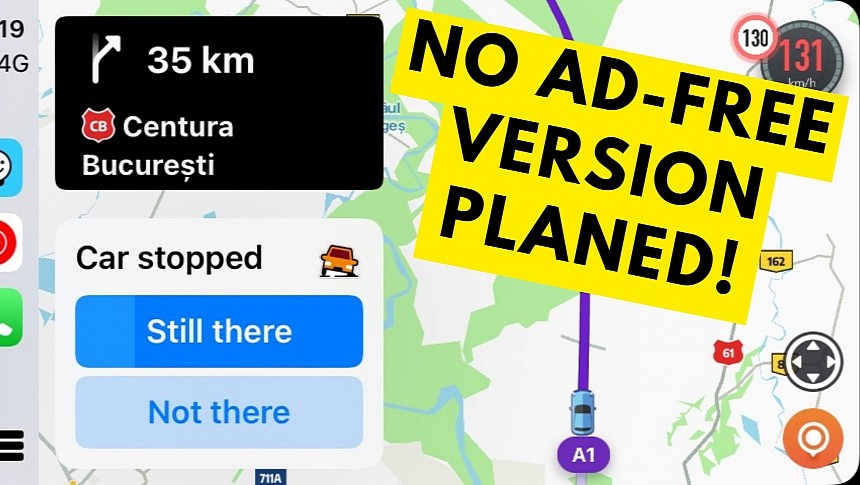There's a good reason why Waze is currently one of the top navigation apps in the world. The crowdsourcing engine that allows users to contribute with traffic reports helps improve the routing engine and eventually keeps drivers up-to-date about traffic conditions.
Eventually, everybody wins. Users get better turn-by-turn guidance and faster routes, while Waze keeps increasing its user base.
If you wonder why a growing user base is critical for the Google-owned company, it all comes down to money. Waze's primary source of revenue is advertisements, so the more users, the more money. The application displays ads in multiple ways, including using small icons on the map and popups appearing when you approach an advertised location.
These ads are typically unintrusive, but some users aren't big fans of being bombarded with popups while driving. As a result, someone requested (and over 1,500 others supported the idea) an ad-free version of Waze with a subscription or a one-time fee.
"I'd pay up to $5 for a version of Waze without advertisements," the feature request reads.
The idea was posted nearly a decade ago when the Waze ads were still in their early days, but the parent company has ignored the request ever since. In a response published not long ago, a member of the Waze team says it loud and clear: an ad-free version of Waze is not on the table. The Waze official said it doesn't fit our roadmap, but "we'll keep in mind for future product planning."
In plain English, Waze has no intention to kill off its money-making engine and switch to a model that could eventually push users to alternative products. The freeware license is the main reason for Waze becoming such a popular application. Alternatives like Sygic offer impressive navigation capabilities, but the subscription-based model limits its audience.
Waze needs a large user community to work correctly, and a subscription or a paid license wouldn't work. Google is a big fan of an ad-based product, and despite the Waze employee claiming they'll consider the idea for future product planning, I doubt this ever happens.
You'll just have to learn to live with ads in Waze, but I don't believe they're a deal breaker, considering how useful this application can sometimes become. It's not difficult to see how ads could eventually force users to look for an alternative app – the more ads, especially displayed in the same region or in succession in a matter of minutes, the bigger the chance to get tired of them and look for another navigation app.
The bigger problem is that users have no real alternative to Waze. Others have already tried to build incident reporting systems similar to Waze, including Apple. Still, the existing solutions feel half-baked and lack the larger community to power the reporting engine.
If you wonder why a growing user base is critical for the Google-owned company, it all comes down to money. Waze's primary source of revenue is advertisements, so the more users, the more money. The application displays ads in multiple ways, including using small icons on the map and popups appearing when you approach an advertised location.
These ads are typically unintrusive, but some users aren't big fans of being bombarded with popups while driving. As a result, someone requested (and over 1,500 others supported the idea) an ad-free version of Waze with a subscription or a one-time fee.
"I'd pay up to $5 for a version of Waze without advertisements," the feature request reads.
The idea was posted nearly a decade ago when the Waze ads were still in their early days, but the parent company has ignored the request ever since. In a response published not long ago, a member of the Waze team says it loud and clear: an ad-free version of Waze is not on the table. The Waze official said it doesn't fit our roadmap, but "we'll keep in mind for future product planning."
In plain English, Waze has no intention to kill off its money-making engine and switch to a model that could eventually push users to alternative products. The freeware license is the main reason for Waze becoming such a popular application. Alternatives like Sygic offer impressive navigation capabilities, but the subscription-based model limits its audience.
Waze needs a large user community to work correctly, and a subscription or a paid license wouldn't work. Google is a big fan of an ad-based product, and despite the Waze employee claiming they'll consider the idea for future product planning, I doubt this ever happens.
You'll just have to learn to live with ads in Waze, but I don't believe they're a deal breaker, considering how useful this application can sometimes become. It's not difficult to see how ads could eventually force users to look for an alternative app – the more ads, especially displayed in the same region or in succession in a matter of minutes, the bigger the chance to get tired of them and look for another navigation app.
The bigger problem is that users have no real alternative to Waze. Others have already tried to build incident reporting systems similar to Waze, including Apple. Still, the existing solutions feel half-baked and lack the larger community to power the reporting engine.








